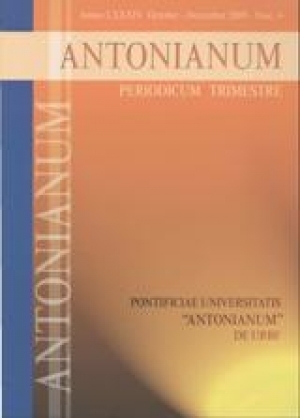 Carbajo Núñez Martín ,
Global ethical challenges in the light of the encyclical Laudato Si' and the Jubilee of Mercy,
in
Antonianum, 91/2 (2016) p. 333-360
.
Carbajo Núñez Martín ,
Global ethical challenges in the light of the encyclical Laudato Si' and the Jubilee of Mercy,
in
Antonianum, 91/2 (2016) p. 333-360
.
In the light of both the Jubilee of Mercy (2016) and the Encyclical Laudato Si' , this article analyzes some global ethical challenges, which reflect an unmerciful world, and makes some suggestions for a new lifestyle based on mercy, gratuitousness, fraternity, and the common good. It is emphasized the fact that the human family "is the first and most important school of mercy" . We need to put into practice that kind of merciful relationships which we usually experience at home during childhood and that help us to discover the real face of our heavenly Father and the mystery of the Trinitarian "We" . The future of our common home depends on it.
Sumario en español: A la luz de la encíclica Laudato Si' y del Jubileo de la Misericordia, en este artículo se analizan algunos desafíos éticos globales que reflejan un mundo inmisericorde. Se subraya que la familia humana "es la primera y más importante escuela de la misericordia". Necesitamos poner en práctica ese tipo de relaciones misericordiosas que aprendemos de pequeños en la casa familiar y que nos ayudan a "descubrir el rostro amoroso de Dios". De ello depende el futuro de la gran familia cósmica.
Sommario in italiano: Alla luce dell'enciclica Laudato Si' e del Giubileo della Misericordia, questo articolo analizza alcune sfide etiche globali che riflettono un mondo immisericorde. Si sottolinea che la famiglia "è la prima e più importante scuola di misericordia". Abbiamo bisogno di mettere in pratica questo tipo di relazioni misericordiose che impariamo da piccoli nella casa famigliare e che ci aiutano a "scoprire il volto amorevole di Dio". Da questo dipende il futuro della grande famiglia cosmica.
Índice
1. A merciless world, devoid of relational goods
1.1. The technocratic paradigm
1.1.1. The consumerist and throwaway culture
1.1.2 "Rapidification" and hyperconnection
1.1.3. Absence of an integral and integrating vision of reality
1.2. Gratuitousness excluded or ignored
1.2.1. Inability to contemplate beauty
1.2.2. A dialectic of perpetual conflict
1.2.3. Institutionalized hatred and revenge
1.3. Instrumental relationships
1.3.1. Individualism rather than individuality
1.3.2. The "non-tuism"
1.4. Total good instead of common good
1.4.1. The globalization of indifference
1.4.2. Economic system without political control
2. Reconciliation and reconstruction of the cosmic family
2.1. Mercy is God's face
2.1.1. Mercy as the foundation of true justice
2.1.2. Conflict resolution
2.2. Retrieving the logic of gift and gratuitousness
2.2.1. Prayerful contemplation instead of despotic rule
2.2.2. The ethics of care and tenderness
2.3. A cordial and universal family
2.3.1. Overcoming a fragmented vision
2.3.2. A direct and friendly communication
2.4. Building together the common good
2.4.1. Dialogue as a method
2.4.2. The politics of mercy
Conclusion
() |
